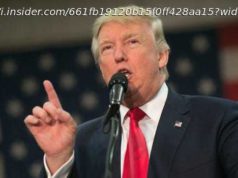You would have thought the market reaction would have been much worse, given that we are now on the brink of a real — not imagined — trade war.
On the way to work early Wednesday morning, the main topic of conversation was the fact that the Dow futures were down less than 200 points, a surprise given the announcement of tariffs on an additional $200 billion of China exports the previous evening.
You would have thought the market reaction would have been much worse, given that we are now on the brink of a real — not imagined — trade war. This fight is principally with China, but there are also tensions with key allies over aluminum and steel tariffs as well as with the EU over auto tariffs.
And yet the U. S. stock market has held up remarkably well. Stocks were down Wednesday, but the S&P 500 is up nearly 5 percent since bottoming in early May, outperforming most other countries, even as the trade wars accelerated.
While some insist that economic growth is the key to the market’s strength, others are noting that the effect of tax cuts and other stimulus is offsetting the negative trade war headlines: “Our belief is that tax reform has enabled the U. S. to withstand the trade battles more so than other countries,” Dan Clifton from Strategas wrote to clients this morning.
He estimates that, as a “worst-case” scenario, tariffs would cost $120 billion, but then he goes on to list the positive offsets from tax cuts and fiscal stimulus:
Tax cuts: $200 billion
Federal spending: $100 billion
Profit repatriation: $500 billion
Source: Strategas
The estimated $800 billion from tax cuts and stimulus is far greater than his estimated worst-case scenario from tariffs of $120 billion, and this is a major fact holding the markets together.
Other market watchers seem to agree. Jan Hatzius of Goldman Sachs also told clients this week that, “We continue to believe the direct effects of the tariffs should be relatively minor for the US economy.” He estimates that the result of all tariffs so far proposed “would lower the level of US GDP by 0.1pp compared with no tariff increases” and that the effect of tariffs are only a small share of corporate profits “to date.”
It’s that “to date” part that has gotten a large part of the investor base considerably more nervous. Mike LaBella from QS Investors noted on CNBC Wednesday that, “Bringing in an additional $200 billion in potential tariffs can quickly escalate to over a trillion dollars of trade-related tariffs that hit both China, the US and the European Union. This is a major issue that the market, up until today, has been completely neglecting.”
The commodity markets aren’t neglecting the threat. Copper is down dramatically in the past month on concerns over a slowdown in China and an increase in trade tensions.
The Federal Reserve, at its last meeting, was already nervous. “[M]any District contacts expressed concern about the possible adverse effects of tariffs and other proposed trade restrictions, both domestically and abroad, on future investment activity; contacts in some Districts indicated that plans for capital spending had been scaled back or postponed as a result of uncertainty over trade policy.”
The Fed said this a month ago (June 12 to 13) — a time when tariffs looked like only a remote possibility. What side of this debate do you think they will be on now that tariffs have become very real?






